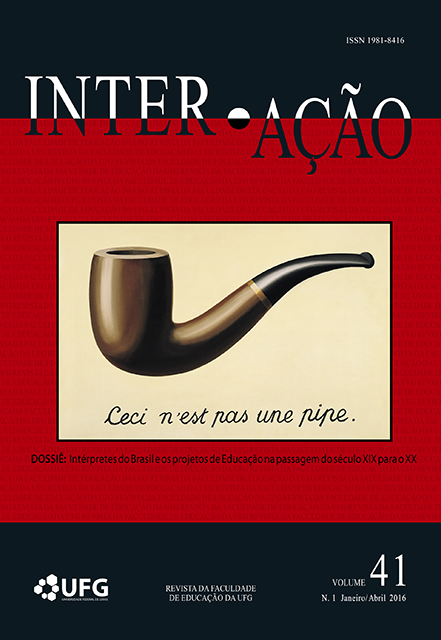LOURENÇO FILHO E A NACIONALIZAÇÃO DO ENSINO PRIMÁRIO (1917-1945)
DOI :
https://doi.org/10.5216/ia.v41i1.38969Résumé
Filho de pai português e mãe sueca, Manoel Bergström Lourenço Filho traria consigo desde a mais tenra infância a inquietação com a nacionalidade. De origem modesta, nascido em 1897 numa pequenina cidade do interior do Estado de São Paulo, ele compartilharia com os brasileiros de sua idade as tensões, angústias e alegrias de ser filho de uma nação em busca de sua identidade no início do século XX. Formado professor em 1914, ele sentiria logo os influxos da maré crescente de nacionalismo provocado pela eclosão da Primeira Guerra Mundial, incorporando-o aos conteúdos do ensino primário ministrado por ele em sua cidade natal, muito deles também filhos de imigrantes. Neste trabalho procura-se reconstruir sua trajetória profissional, pontuando-se nos seus momentos mais significativos a relação entre seus conceitos de nação, estado e educação e as propostas efetivamente assumidas no âmbito do Ministério da Educação e Saúde. Essa análise permite perceber distintamente o uso que o intelectual Lourenço Filho faz de sua competência técnica para tentar impor suas concepções na definição da política educacional durante a ditadura varguista.
Téléchargements
Téléchargements
Publié-e
Comment citer
Numéro
Rubrique
Licence
A Inter-Ação utiliza como base para transferência de direitos a licença Creative Commons Attribution 4.0 para periódicos de acesso aberto (Open Archives Iniciative - OAI). Por acesso aberto entende-se a disponibilização gratuita na Internet, para que os usuários possam ler, baixar, copiar, distribuir, imprimir, pesquisar ou referenciar o texto integral dos documentos, processá-los para indexação, utilizá-los como dados de entrada de programas para softwares, ou usá-los para qualquer outro propósito legal, sem barreira financeira, legal ou técnica.
Autores que publicam neste periódico concordam com os seguintes termos:
1) Autores mantém os direitos autorais e concedem à revista o direito de primeira publicação, com o trabalho simultaneamente licenciado sob a Licença Creative Commons Attribution que permite o compartilhamento do trabalho com reconhecimento da autoria e publicação inicial nesta revista.
2) Autores têm autorização para assumir contratos adicionais separadamente, para distribuição não-exclusiva da versão do trabalho publicada nesta revista (ex.: publicar em repositório institucional ou como capítulo de livro), com reconhecimento de autoria e publicação inicial nesta revista.
3) Autores têm permissão e são estimulados a publicar e distribuir seu trabalho online (ex.: em repositórios institucionais ou na sua página pessoal) a qualquer ponto antes ou durante o processo editorial, já que isso pode gerar alterações produtivas, bem como aumentar o impacto e a citação do trabalho publicado.















